Related Research Articles
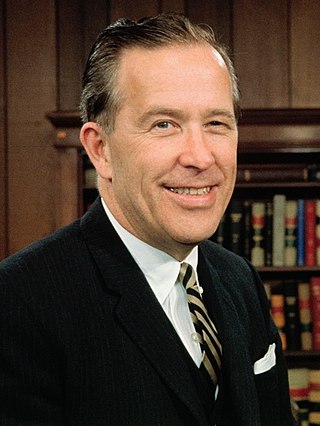
Henry Martin "Scoop" Jackson was an American lawyer and politician who served as a U.S. representative (1941–1953) and U.S. senator (1953–1983) from the state of Washington. A Cold War liberal and anti-Communist member of the Democratic Party, Jackson supported higher military spending and a hard line against the Soviet Union, while also supporting social welfare programs, civil rights, and labor unions.
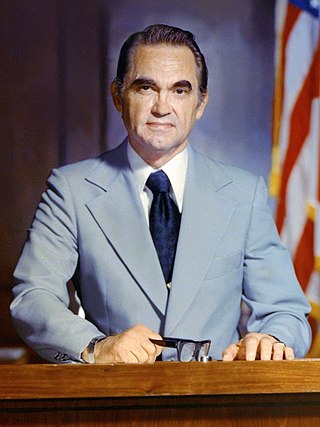
George Corley Wallace Jr. was an American politician and judge who served as the 45th governor of Alabama for four terms. He is remembered for his staunch segregationist and populist views. During Wallace's tenure as governor of Alabama, he promoted "industrial development, low taxes, and trade schools." Wallace unsuccessfully sought the United States presidency as a Democratic Party candidate three times, and once as an American Independent Party candidate, carrying 5 states in the 1968 election. Wallace opposed desegregation and supported the policies of "Jim Crow" during the Civil Rights Movement, declaring in his 1963 inaugural address that he stood for "segregation now, segregation tomorrow, segregation forever."

George Richards Minot was an American medical researcher who shared the 1934 Nobel Prize in Physiology or Medicine with George Hoyt Whipple and William P. Murphy for their pioneering work on pernicious anemia.
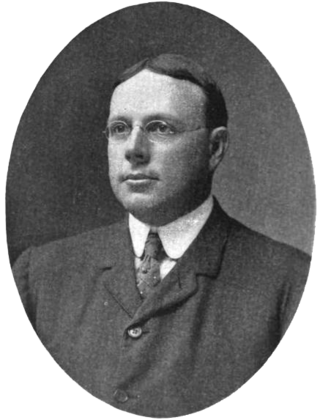
George Robert Carter was the second territorial governor of Hawaii, serving from 1903 to 1907.
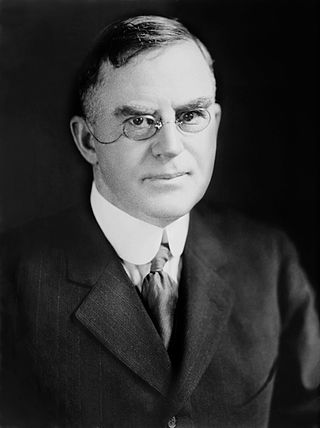
Henry Cantwell Wallace was an American farmer, journalist, and political activist who served as the secretary of agriculture from 1921 to 1924 under Republican presidents Warren G. Harding and Calvin Coolidge. He was the father of Henry A. Wallace, who would follow in his father's footsteps as secretary of agriculture and later became vice president under President Franklin D. Roosevelt. He was an editor of Wallaces' Farmer from 1916 to 1921.

Henry Ernest Cooper was an American lawyer who moved to the Kingdom of Hawaii and became prominent in Hawaiian politics in the 1890s. He formally deposed Queen Lili'uokalani of Hawaii in 1893, held various offices in the ensuing Provisional Government of Hawaii and Republic of Hawaii governments, and was the first United States Territory of Hawaii Attorney General, 1899–1900. He later became a circuit judge in Honolulu.

The Early Birds of Aviation is an organization devoted to the history of early pilots. The organization was started in 1928 and accepted a membership of 598 pioneering aviators.

Carter's Little Liver Pills were formulated as a patent medicine by Samuel J. Carter of Erie, Pennsylvania, in 1868.

William Wallace Crapo was a member of the United States House of Representatives from Massachusetts. He was elected to fill the vacancy caused by the death of James Buffinton. He served slightly more than three terms in congress from November 2, 1875 to March 3, 1883
Henry Southworth Allen is an American Pulitzer Prize-winning critic, journalist, poet, and artist.
Henry Hoyt may refer to:

The Stand in the Schoolhouse Door took place at Foster Auditorium at the University of Alabama on June 11, 1963. In a symbolic attempt to keep his inaugural promise of "segregation now, segregation tomorrow, segregation forever" and stop the desegregation of schools, George Wallace, the Governor of Alabama, stood at the door of the auditorium as if to block the way of the two African American students attempting to enter: Vivian Malone and James Hood.

Henry Martyn Hoyt Jr. served as Solicitor General of the United States from 1903 to 1909. His father, also named Henry Martyn Hoyt, served as governor of Pennsylvania from 1879 to 1883.
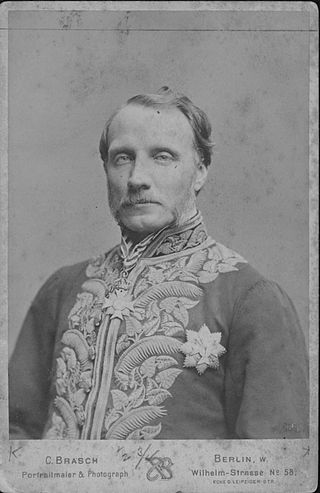
Henry Alpheus Peirce Carter, also known as Henry Augustus Peirce Carter, was an American businessman, politician, and diplomat in the Kingdom of Hawaii.

Henry Brockholst Ledyard Sr. was the mayor of Detroit, Michigan, and a state senator, briefly served as assistant secretary under Secretary of State Lewis Cass, and was the president of the Newport Hospital and the Redwood Library in Newport, Rhode Island.

The Supreme Court of Sierra Leone is the highest court in Sierra Leone. It has final jurisdiction in all civil, criminal, and constitutional cases within Sierra Leone, and its decisions cannot be appealed. The Supreme Court has the exclusive constitutional power to overturn ruling of lower courts within the jurisdiction of Sierra Leone. The Supreme Court, along with the Court of Appeals, High Court of Justice, and magistrate courts form the Judicial branch of the Government of Sierra Leone.
Carter-Wallace was a personal care company headquartered in New York City. The company was formed by the merger of Carter Products and Wallace Laboratories. The company had a research facility in Cranbury, New Jersey.
Princeton was founded by Europeans in the latter part of the 17th century. Because of a dispute over school taxes, the municipality split into the Borough of Princeton and Princeton Township in 1894, and both became fully independent municipalities. On January 1, 2013, the two consolidated as Princeton under a borough form of government.

Almina Herbert, Countess of Carnarvon, was the wife of George Herbert, 5th Earl of Carnarvon, and châtelaine of Highclere Castle in Hampshire. After her second marriage, she became Mrs Almina Dennistoun, although she called herself Almina Carnarvon. It was her wealth that funded the search for Tutankhamun's tomb in Egypt.
Henry Ladd Corbett was an American businessman, civic leader, and politician in the state of Oregon. He was born into one of the wealthiest and most influential families in Oregon. Corbett attended Harvard University and then returned to Oregon to manage family business interests. Over the years, he served as president of the Portland Chamber of Commerce and president of Portland Port Commission. He also represented Multnomah County in the Oregon State Senate, serving two terms as President of the Senate. He served as acting governor of Oregon twice in 1927.
References
- 1 2 "Henry Hoyt, 96, Dies. Headed Drug Company". New York Times . November 7, 1990. Retrieved 2011-09-24.
- ↑ "Carter-Wallace". Wall Street Journal . August 12, 1965. Archived from the original on January 31, 2013. Retrieved 2011-09-26.